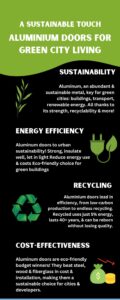
A Sustainable Touch: Aluminium Doors for Green City Living
As cities evolve towards more sustainable futures, the role of aluminium becomes increasingly pivotal. Let’s delve into how this versatile metal is shaping the green cities of tomorrow. “The fact that nearly 75% of all aluminium ever produced is still in use today showcases its durability and long-term value in urban sustainability.
The Imperative of Aluminium in Urban Sustainability
Aluminium is one of the most abundant metals on Earth, making it readily available for widescale use. Its unmatched strength-to-weight ratio, corrosion resistance, durability, and 100% recyclability establish aluminium as a core sustainable building material. By incorporating aluminium into architecture and infrastructure, cities can significantly reduce their carbon footprints.
Urban planners are increasingly using aluminium to achieve sustainability goals such as reducing energy consumption, lowering pollution, and diverting waste from landfills. Aluminium enables greener transportation through lighter vehicles and electric infrastructure. It allows buildings to maximize natural light and ventilation through expansive glass facades. Recycling and promoting renewable energy also depend heavily on aluminium and its alloys.
In simple terms, the importance of aluminium in sustainable urban development is significant and multifaceted. This metal will continue enabling cities to achieve environmental ambitions for decades to come.
Aluminium Doors: A Gateway to Energy Efficiency
Focusing on the microcosm of urban sustainability, aluminium doors emerge as key players in energy efficiency. While specific data on the energy efficiency of aluminium doors in buildings is limited, aluminium’s high strength-to-weight ratio makes it an excellent material for energy-efficient building designs.
Aluminium doors with thermal breaks can significantly improve insulation. Narrow frame profiles give aluminium doors an advantage over other materials by allowing more light to enter buildings, reducing the need for artificial lighting. Aluminium’s lifetime durability also beats frequent door replacements required by lower-performing materials.
Cities like Toronto, Vancouver, and Seattle have integrated aluminium doors into energy-efficient building codes and green building certification programs. The long-term financial and environmental savings make aluminium doors a gateway to energy efficiency.
The Lifecycle of Aluminium Doors: From Production to Recycling
While aluminium doors lead the way in energy efficiency, their journey from production to recycling is equally remarkable. “The North American aluminium industry has cut its carbon footprint by more than half over the past 30 years, emphasizing the sustainable lifecycle of aluminium products”.
Aluminium production is extremely recyclable and energy efficient. Modern smelting processes recycle significant amounts of energy while emitting low levels of greenhouse gases. Recycled aluminium also requires just 5% of the energy needed to produce primary aluminium.
Once installed, aluminium doors have lifespans over 40 years with minimal maintenance. And unlike other materials, aluminium can be endlessly recycled back into new doors or products at the end of its lifespan without losing any material quality or integrity. This closed-loop recycling system is a key component of aluminium’s sustainability.
The Economic Perspective: Cost-Effectiveness of Aluminium Doors
For city governments and developers, sustainability goals must be balanced with financial ones. Here aluminium doors also prove valuable given their cost-effectiveness. The raw material price of aluminium is competitive with steel. Combined with lower maintenance over decades of use, it gives aluminium doors an economic edge.
Life cycle cost analyses consistently show aluminium doors performing better than steel, wood, and fiberglass alternatives. Fast fabrication and installation also make projects with aluminium doors more profitable than comparable materials. Despite higher initial price tags than basic options, aluminium doors win big from an economic sustainability standpoint.
Aluminium Doors and the Global Push for Greener Cities
As the world mobilizes to combat climate change, greener cities have become a top priority. Milestones like the Paris Agreement have accelerated urban sustainability initiatives globally. Aluminium products like doors already align well with these ambitions.
Organizations such as the Aluminium Association actively collaborate with policymakers, developers, and sustainability groups to expand aluminium’s role in green buildings. Stricter building codes, efficiency standards, and green certifications will further propagate aluminium doors in eco-conscious cities worldwide.
Challenges and Solutions in Aluminium Door Implementation
Transitioning fully to sustainable aluminium doors faces some hurdles. Cost may deter individuals and smaller developers. Lack of awareness and information about lifecycle benefits can limit uptake. Insufficient recycling infrastructure in some regions reduces potential gains.
But solutions exist, like subsidizing green projects, showcasing successful case studies, and gradually strengthening codes and standards. Designers can also innovate on manufacturing techniques to make aluminium doors even more cost-effective. Ample room remains for aluminium to capture untapped sustainability potential.
The Future of Aluminium Doors in Urban Development
Looking ahead, the role of aluminium doors in urban sustainability will only grow. With cities expanding rapidly, especially across Asia and Africa, aluminium emerges as the ideal material for new construction. Its light weight and strength allow larger doors that maximize natural light and ventilation.
Technological improvements will also boost performance. A future powered by renewable energy would make aluminium doors even more sustainable to produce. And increased adoption will scale up recycling significantly. Aluminium has cemented itself as an indispensable pillar of sustainable city infrastructure.

FAQs
Why are aluminium doors a good choice for eco-friendly homes?
Aluminium doors are made using recycled content. This sustainable material helps reduce environmental impact. They are also durable, safe, and energy efficient.
Do aluminium doors provide good insulation?
Yes, advanced aluminium doors have thermal-breaks that prevent heat and cool air from escaping. This maximizes energy savings.
Are aluminium doors inexpensive?
While aluminium doors themselves are affordably priced, professional installation adds cost. However, these hard-wearing doors deliver lasting value by eliminating maintenance expenses down the road.
How do aluminium doors enhance home safety?
Aluminium doors increase protection via sturdy frames that cannot warp, crack or splinter like wood. Contemporary aluminium models also integrate steel reinforcements and advanced locking mechanisms for extra security.
Are aluminium doors available in different styles?
Aluminium doors now offer great customization options. Homeowners can select frames in over 200 paint colors, varied finishes from matte to glassy, diverse designs from modern to traditional, and customized hardware and glass for unique expression.
Bottom Line
As more people move to cities worldwide, towns can take this chance to add sustainable building materials. Aluminium doors better align with eco-friendly objectives compared to conventional options. Well-crafted aluminium doors enhance energy savings, minimize environmental impact, offer affordable pricing, and provide modern or classic styling that residents appreciate.
When city leaders make informed plans that call for durable aluminium doors, they take decisive action to reach green living aims both today and for future generations. Going forward, the growing use of aluminum doors can pave the path for urban areas seeking to improve in sustainable ways that benefit all.